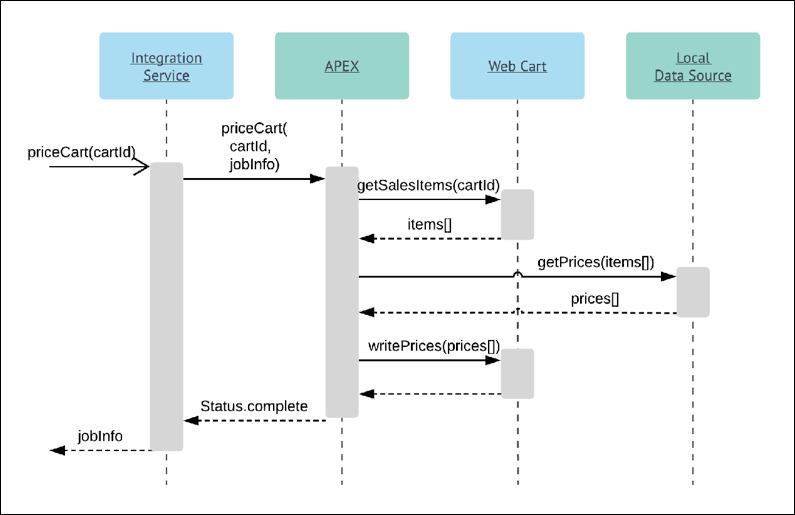Intro
The checkout flow in Salesforc B2B Commerce Cloud (LEX version) provides four integration points as standard.
In this “Integration Series”, I would like to briefly read about the Sample Apex Class code provided by the official (as of Spring`21) .
Async Integraton Structure
First of all,I would like to check the structure of the asynchronous integration process.
The following is a graphical representation of Price Check’s asynchronous external system integration process.
The overall structure is as follows:
- “Price Cart” Subflow calls “PriceCart” IntegrationService.
- “PriceCart” IntegrationService calls “B2B Pricing Sample” Apex Class.
- Apex gets WebCart item info
- Apex gets price info of each item from external system via API
- Apex writes the price info to the cart.
- Apex returns “complete” status to IntegrationService
- IntegrationService returns “jobInfo” to Subflow

Outline of the process
Next, let’s check the concrete process of the Apex Class.
The process of “B2BCheckInventorySample” Apex Class consists of the following three major parts.
1. Get the information of the cart items and store the SKU and quantity respectively in Map.
2. POST an HTTP request containing SKU information to an external system, and obtain information on the quantity of each SKU from the response.
3. Checks if the number of stock in the external system > the quantity of cart items ordered; returns a status of SUCCESS if TRUE, or an error message if FALSE.
Actual Code
// This must implement the sfdc_checkout.CartInventoryValidation interface
// in order to be processed by the checkout flow and used for your Check Inventory integration.
global with sharing class B2BCheckInventorySample implements sfdc_checkout.CartInventoryValidation {
global sfdc_checkout.IntegrationStatus startCartProcessAsync(sfdc_checkout.IntegrationInfo jobInfo, ID cartId) {
sfdc_checkout.IntegrationStatus integStatus = new sfdc_checkout.IntegrationStatus();
try {
// Get all SKUs and their quantities from cart items.
Map<String, Decimal> quantitiesFromSalesforce = new Map<String, Decimal>();
for (CartItem cartItem : [SELECT Sku, Quantity FROM CartItem WHERE CartId = :cartId AND Type = 'Product' WITH SECURITY_ENFORCED]) {
if (String.isBlank(cartItem.Sku)) {
String errorMessage = 'The SKUs for all products in your cart must be defined.';
return integrationStatusFailedWithCartValidationOutputError(
integStatus,
errorMessage,
jobInfo,
cartId
);
}
quantitiesFromSalesforce.put(cartItem.Sku, cartItem.Quantity);
}
// Stop checkout if there are no items in the cart
if (quantitiesFromSalesforce.isEmpty()) {
String errorMessage = 'Looks like your cart is empty.';
return integrationStatusFailedWithCartValidationOutputError(
integStatus,
errorMessage,
jobInfo,
cartId
);
}
// Get all available quantities for products in the cart (cart items) from an external service.
Map<String, Object> quantitiesFromExternalService = getQuantitiesFromExternalService(quantitiesFromSalesforce.keySet());
// For each cart item SKU, check that the quantity from the external service
// is greater or equal to the quantity in the cart.
// If that is not true, set the integration status to "Failed".
for (String sku : quantitiesFromSalesforce.keySet()) {
Decimal quantityFromSalesforce = quantitiesFromSalesforce.get(sku);
Decimal quantityFromExternalService = (Decimal)quantitiesFromExternalService.get(sku);
if (quantityFromExternalService == null){
String errorMessage = 'The product with sku ' + sku + ' could not be found in the external system';
return integrationStatusFailedWithCartValidationOutputError(
integStatus,
errorMessage,
jobInfo,
cartId
);
}
else if (quantityFromExternalService < quantityFromSalesforce){
String errorMessage = 'Insufficient quantity for the product with sku ' + sku + ': '
+ quantityFromSalesforce + ' needed, but only '
+ quantityFromExternalService + ' available.';
return integrationStatusFailedWithCartValidationOutputError(
integStatus,
errorMessage,
jobInfo,
cartId
);
}
else {
// If the product exists and the available quantity is enough, set status as SUCCESS
integStatus.status = sfdc_checkout.IntegrationStatus.Status.SUCCESS;
}
}
} catch(Exception e) {
// For testing purposes, this example treats exceptions as user errors, which means they are displayed to the buyer user.
// In production you probably want this to be an admin-type error. In that case, throw the exception here
// and make sure that a notification system is in place to let the admin know that the error occurred.
// See the readme section about error handling for details about how to create that notification.
return integrationStatusFailedWithCartValidationOutputError(
integStatus,
'An exception of type ' + e.getTypeName() + ' has occurred: ' + e.getMessage(),
jobInfo,
cartId
);
}
return integStatus;
}
private Map<String, Object> getQuantitiesFromExternalService (Set<String> skus) {
Http http = new Http();
HttpRequest request = new HttpRequest();
Integer SuccessfulHttpRequest = 200;
// Encode the product SKUs to avoid any invalid characters in the request URL.
Set<String> encodedSkus = new Set<String>();
for (String sku : skus) {
encodedSkus.add(EncodingUtil.urlEncode(sku, 'UTF-8'));
}
// To access the service below, add endpoint = https://b2b-commerce-test.herokuapp.com in Setup | Security | Remote site settings.
request.setEndpoint('https://b2b-commerce-test.herokuapp.com/get-inventory?skus=' + JSON.serialize(encodedSkus));
request.setMethod('GET');
HttpResponse response = http.send(request);
// If the request is successful, parse the JSON response.
// The response includes the available quantity for each SKU and uses the following format:
// {"SKU-25-10028":9999.00, "SKU-25-10030":9999.00}
// Because this is a sample, and we want this integration to return success.
// The external service returns the exact list of SKUs it receives
// and an available quantity of 9999 for each SKU.
// If the cart has an item with a quantity higher than 9999, the integration returns an error.
if (response.getStatusCode() == SuccessfulHttpRequest) {
Map<String, Object> quantitiesFromExternalService = (Map<String, Object>) JSON.deserializeUntyped(response.getBody());
return quantitiesFromExternalService;
}
else {
throw new CalloutException ('There was a problem with the request. Error: ' + response.getStatusCode());
}
}
private sfdc_checkout.IntegrationStatus integrationStatusFailedWithCartValidationOutputError(
sfdc_checkout.IntegrationStatus integrationStatus, String errorMessage, sfdc_checkout.IntegrationInfo jobInfo, Id cartId) {
integrationStatus.status = sfdc_checkout.IntegrationStatus.Status.FAILED;
// To propagate the error to the user, we need to add a new CartValidationOutput record.
// The following fields must be populated:
// BackgroundOperationId: Foreign Key to the BackgroundOperation
// CartId: Foreign key to the WebCart that this validation line is for
// Level (required): One of the following - Info, Error, or Warning
// Message (optional): Message displyed to the user
// Name (required): The name of this CartValidationOutput record. For example CartId:BackgroundOperationId
// RelatedEntityId (required): Foreign key to WebCart, CartItem, CartDeliveryGroup
// Type (required): One of the following - SystemError, Inventory, Taxes, Pricing, Shipping, Entitlement, Other
CartValidationOutput cartValidationError = new CartValidationOutput(
BackgroundOperationId = jobInfo.jobId,
CartId = cartId,
Level = 'Error',
Message = errorMessage.left(255),
Name = (String)cartId + ':' + jobInfo.jobId,
RelatedEntityId = cartId,
Type = 'Inventory'
);
insert(cartValidationError);
return integrationStatus;
}
}